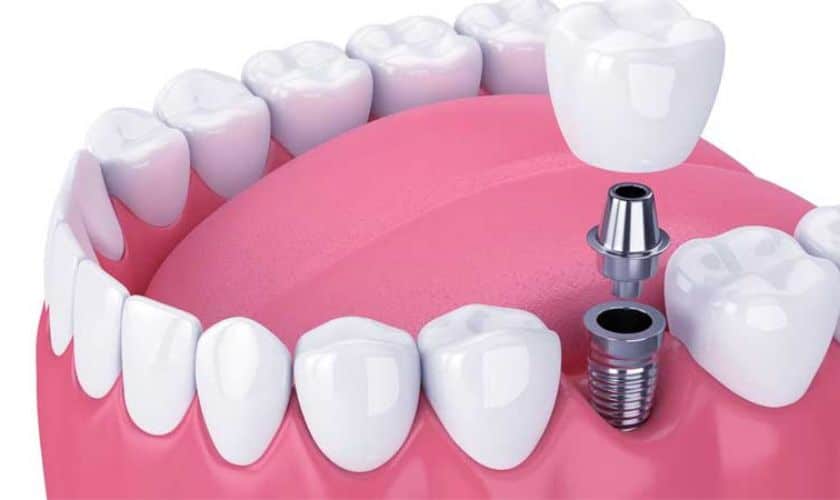As you embark on your journey with dental implants, maintaining proper oral hygiene becomes crucial for their longevity and success. Dental implants offer a durable and natural-looking solution for tooth replacement, but they require diligent care to ensure their continued function and aesthetics. This informative blog will provide essential tips and practices to keep your dental implants in top condition. From brushing and flossing techniques to regular dental check-ups, we will guide you on the best practices to maintain a healthy and radiant smile. Discover how to prevent complications and maximize the lifespan of your dental implants, allowing you to enjoy the benefits of a restored smile for years to come. We aim to empower you with knowledge, enabling you to take charge of your oral health and embrace the confidence of a well-maintained, beautiful smile.
What Is A Dental Implant?
Dental implants are a revolutionary solution for replacing missing teeth. Unlike traditional dentures or bridges, dental implants provide a permanent and natural-looking alternative anchored directly into the jawbone. It consists of three main components: the implant, an abutment, and a prosthetic tooth. The implant is typically made of titanium and is the artificial tooth root that fuses with the jawbone through osseointegration. An abutment is attached once the implant has successfully integrated into the bone. This acts as a connector between the implant and the prosthetic tooth. The final step involves placing a custom-made crown or bridge onto the abutment, completing your new smile. One of the greatest advantages of dental implants is their ability to mimic natural teeth in both form and function. They blend seamlessly with your existing teeth, providing stability while eating or speaking. Additionally, they stimulate bone growth in the jaw, preventing further bone loss associated with missing teeth. Dental implants offer an innovative way to restore your smile by replacing missing teeth permanently. Their durability and lifelike appearance can enhance oral health and boost confidence in social situations.
Types Of Medical Conditions And Dental Implants
Certain medical conditions may affect the procedure’s success regarding dental implants. It is important to be aware of these conditions and discuss them with your dentist before implant surgery. One such condition is uncontrolled diabetes. Diabetes can impair the body’s ability to heal, impacting the healing process after dental implant placement. However, well-controlled diabetes does not necessarily rule out getting dental implants. Another condition to consider is osteoporosis. This bone disease weakens bones and increases the risk of fractures. In cases where a patient has severe osteoporosis, their jawbone density may be compromised, making it difficult for dental implants to anchor properly. Patients with autoimmune diseases like rheumatoid arthritis or lupus should also take caution when considering dental implants. These conditions can cause inflammation in various body parts, including the gums and jawbone. Proper evaluation by a dentist will help determine if implants are a suitable option. Additionally, patients who smoke or have a smoking history may experience complications during implant surgery due to reduced blood flow and impaired healing capabilities. Each case must be evaluated carefully by a qualified dentist who can assess whether someone is an appropriate candidate for dental implants based on their specific medical condition. Remember, this list only highlights some common medical conditions that may pose challenges when considering dental implants. Before proceeding with implant treatment, consulting with your dentist about any existing health concerns is crucial.
Treatment Of Medical Conditions And Dental Implants
One of the most important factors to consider when it comes to dental implants is the treatment of underlying medical conditions. This is because certain medical conditions can affect the success and outcome of your dental implant procedure. It’s essential to thoroughly discuss any medical conditions you may have with your dentist. This will allow them to assess whether you are a suitable candidate for dental implants and if any precautions need to be taken during treatment. Some medical conditions that may impact dental implant treatment include diabetes, heart disease, osteoporosis, and autoimmune disorders. These conditions can affect bone healing, immune response, and oral health. For example, individuals with uncontrolled diabetes may experience delayed healing after implant surgery. In such cases, it’s crucial to work closely with both your dentist and primary care physician to ensure proper management of your condition before proceeding with dental implants. In addition to managing existing medical conditions, preventative measures are vital in ensuring successful implant integration. This includes maintaining good oral hygiene habits such as brushing, flossing, and visiting your dentist for professional cleanings. Addressing any underlying medical concerns before dental implant treatment and following proper post-operative care instructions recommended by your dentist or oral surgeon can increase the likelihood of a positive outcome from this restorative procedure.
Dental implants can be a life-changing solution for individuals who have lost one or more teeth. Before starting with dental implant treatment, you should consult with your dentist and let your dentist know about any pre-existing health conditions you may have. This will allow them to develop a personalized treatment plan that considers your needs and minimizes potential risks. Addressing medical concerns appropriately before dental implant surgery can increase the chances of long-term success while enjoying the benefits of a restored smile and improved oral health. Don’t let medical conditions deter you from exploring dental implants as an option for tooth replacement. With proper evaluation and thoughtful planning by qualified professionals in both dentistry and medicine, you can still achieve a beautiful smile that enhances your overall well-being. Take charge of your oral health today!


